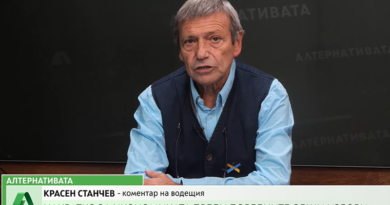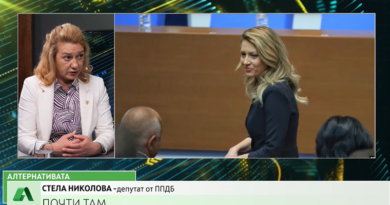Alternatives & Analyses: How did Navalny outplay Putin
Until recently, Vladimir Putin enjoyed the image of a political Houdini, capable of dealing with any crisis, while restoring Russia’s international prestige globally and holding internal opposition at bay.
Navalny’s shocking revelations are shattering this legacy. The Russian President is neither the first, nor the last Russian ‘Tzar’ to engage secret services in poisoning, assassinations, smear campaigns against political opponents.
Alexei Navalny’s latest information bomb represents a political Chernobyl for Putin, which might be the prelude to his political exit.
What’s new in Navalny’s case and the confessions of the FSB agent?
First, Navalny publicly humiliated Putin and his secret services by exposing the gaps between a digital-era politician and the Kremlin’s analogous ruler and his Pretorian guard.
The Russian President seems knocked down by a much lighter boxer. He is desperately trying to buy time, clinging to the face-saving version that foreign agents were involved in the assassination attempt. The fact is that the blow came from the digitally savvy Russian opposition networks, which managed to synergize various independent investigative groups’ potential. This anti-System Network proved its resilience, operating beyond Putin’s reach. This Network now seems more vital, more flexible and relevant than the totalitarian state’s cumbersome hierarchical repression machine.
Second, Navalny destroyed the magic around Vladimir the Invincible, by carefully planning successive moves. He lured the Russian President into the his vanity and hubris trap, relying on Putin’s monarchic aloofness – had the Sovereign desired it, Navalny would have been wasted. By denying Navalny’s story, Putin admitted that licensing assassinations was conceivable, albeit a hypothetical option, acknowledging he had ordered surveillance of Navalny.
This new narrative contradicts the previous ‘ignore-Navalny’ strategy.
Kremlin’s pride rested in Russian secret services’ perceived omnipotence when hacking the West’s most sensitive institutions. Russian propaganda nourished the belief that blunders, exposing the President are unthinkable. Reality turned out differently – the secret services now seem obsolete and irrelevant.
These articles analyses and comments are made possible thanks to your empathy and contributions, which are the only guarantors of independence and objectivity in our work. The Alternatives and Analysis team.
Kremlin’s first reaction to Navalny’s phone conversation with one of his killers was to frantically deny the obvious, claiming a planned provocation and manipulation on the part of the Western secret services.
Putin’s media machine missed the central point – at stake is not Alexei Navalny’s personality, but Kremlin’s policy and its assassinations’ record.
Thirdly, Putin loses strategically and tactically as he persists in disregarding Navalny as a political adversary on a par with him. The initial plan to keep Alexei off the headlines and marginalize his challenge collapsed. Navalny has taken the initiative and forced the Kremlin into a lose-lose situation.
The world is now observing a personal and direct Putin – Navalny confrontation. Alexei’s actions and words are all over the international media, shaping public opinion and engaging governments.
Fourth, Navalny’s shocking revelations are a typical example of aikido politics, turning the tables on Putin’s dictatorship. Alexei succeeded because he accurately surmised the FSB’s agent mindset – fearing the Boss and ignoring rules and procedures. There is no other plausible explanation for the fact that an FSB agent would share details of a top-secret operation in an unsecure phone line conversation.
Fifth, Putin pushed through legislation granting him lifetime immunity against criminal prosecution, thus reinforcing rumours he is on his way out. Here again – his acts are contentious or at least subject to two interpretations –
a. any legislation can be changed by the new Tzar, and
b. the Navalny case involves an internationally banned use of chemical weapons against civilians, sanctioned by Putin, which falls into the International Criminal Court’s jurisdiction. Although Russia withdrew from the Rome Statute’s ratification process four years ago, any ICC prosecutor can issue an international arrest warrant for Putin. His immunity as head of state will not help. Russia’s withdrawal from the ICC came after the Court’s ruling that Russian troops’ presence in Crimea constitutes “a continuing occupation“. Urgent changes in the Russian legislation followed, reaffirming Russia’s domestic law supremacy over international law, including ICC acts.
With the „wanted by the ICC“ tag, the Russian President becomes an international pariah and a prisoner in his own country.
The damage to Russia’s reputation, the heavy economic and social cost may turn the Russian boyars against the Tzar.
Further investigations by Navalny and his team will continue, as they dig in the FSB troves of secret operations against Putin’s political opponents, both successful and unsuccessful.
Alexei Navalny and his team demonstrate that they have no intention of losing the initiative and easing the pressure. The Russian authorities’s reactions seem incoherent, reminiscent of the late Soviet „doom and gloom’ mood.
Attempts to „intimidate“ the European Union by imposing preemptive sanctions, expanding the list of politicians and officials banned from entering Russia seem pathetic, especially against the background of incoming travel data.
While Vladimir Putin can seek refuge from criminal prosecution in Russia, the Western politicians, who supported his energy projects, are feeling the heat after Navalny’s recent actions.
Chancellor Merkel tried to balance her support for Nord Stream 2 by providing shelter and medical aid to Alexei. However, the „Berlin patient“ chose to follow his gameplan and disregarded Putin’s German partners’ concerns.
Ilian Vassilev
Thank you for your donnations via PayPal and bank transfers to IBAN BG58UBBS80021090022940




